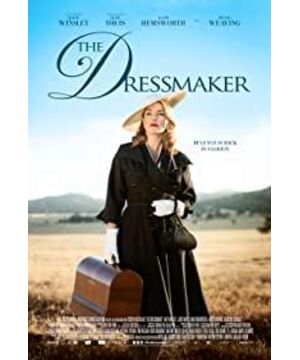It's been many years since the last time I saw a Kate Winslet movie, Titanic, a classic of classic movies. In 2015's "The Tailor", she is still amazing: long curly golden hair, deep and three-dimensional facial features, a small face, a long black coat wrapped around a bumpy body, with a pair of "hate sky high" on her feet. ', a faintly contemptuous smile evoked at the corner of his mouth from time to time.
Every time I watch Kate's film, it seems to me like a baptism of aesthetic concept. According to the popular aesthetic standard of "being thin is beautiful", if Kate is in China, she may be on the hot search because of her figure. Asian actresses are almost all thin bodies. In order to maintain their image in front of the camera, they also carry out strict body management, such as "only eat four mouthfuls of instant noodles", "eat one when you are hungry" "Lao Ganma", "Just one bite of each dish", etc., how hard female stars can work to lose weight, only they can't think of it, but they can't do it. In an interview, Qin Lan said frankly: "actors who are really on camera look like ghosts in private." There is no doubt that this concept of "being thin is beautiful" has been deeply ingrained in the minds of many Asian girls. , penetrated into all aspects of daily life, is beauty really so monotonous? Girls in Europe and America are completely different. They are fat and thin, and they will not affect their dressing choices because of their body shape. They will not dare to wear suspenders because they feel that their arms are thick, and they will not be afraid of wearing suspenders because of elephant legs. Reject summer hot pants, and will not give up your favorite dress because of the fat on your waist. They may not have swan arms, A4 waist, chopsticks and legs, but it's hard to say that they are ugly. why? Because aesthetics should be diversified. Before Tilly arrived, the women of Deng Geta were dressed in rustic clothes, especially Xiao Ge, the daughter of the fruit store, who was slightly fat and had dull skin. The eyes hidden behind the glasses were dull, and his sweetheart, William, didn't even look straight. glance at her. But after putting on the dress that Tilly customized for her, she made her debut at the ball and successfully won the favor of William. Is it just a dress that changed Xiaoge? the answer is negative. What really changed Xiao Ge and many women in Denggeta was the self-confidence radiated from the inside out - if you believe that you are beautiful and worthy of beautiful things, then you are beautiful. The charm of clothing is that it is a woman's shirt, giving it enough courage and strength to be invincible and invincible on the battlefield of life. The ultimate goal of clothing design should be to find a suitable shirt for everyone, rather than kidnap people's aesthetics with a unified standard. It is people who dress, not clothes to challenge people. Aesthetic freedom is to be completely liberated from "skinny people look good in anything", and every woman can proudly think: "Old lady looks good in anything" when standing in front of the wardrobe.
The arrival of Tilly liberated Denggeta's aesthetics, but the ignorance of thought is by no means solved by a few beautiful dresses. Similar to the vast majority of closed small villages and towns, in Denggota, which is familiar to everyone, having secrets has become a luxury. In places where personal privacy is not respected, everyone is a public figure. Once there is a scandal, it will become a household name in no time. People don't care about the truth. Life is too monotonous and boring, and they need something to talk about after dinner. As for how much harm the rumors will bring to the parties, it is not within the scope of their thinking ability, and the selfishness of human nature is exposed here. Tilly is the victim of such a rumor. Because of a misjudgment by a police officer in her childhood, she has since taken on the notoriety of a murderer, endured all the malice of Deng Geta, endured the torment of her conscience, and once thought she was a murderer. "Cursed". Regardless of whether they are victims or not, the people in the town are all under the guise of justice and vent their hatred on Tilly, except for her mother Molly and her lover Teddy. Tilly made a lot of efforts in order to change everyone's opinion and wash away her grievances - she customized gorgeous dresses for each of them, but it was in vain after all. The deaths of Teddy and Molly allude to the power of the individual to completely heal the inherited numbness and prejudice that has penetrated deep into the collective unconscious, like a mayfly shaking a tree. No pain, no understanding, only destruction can change this group of rabble, awaken their sleeping conscience, stimulate their consciousness of independent thinking and judgment, and become a real "modern person". Tilly's fire was actually the dawn of Dengota.
At the end of the film, on the train, the conductor asked Tilly where she was going. She looked at the sad place in the fire outside the window and spit out a word: "Paris." I believe that Paris did not appear in the movie by accident. A casual destination, it is the opposite of Dengta, the ideal land of aesthetic freedom and spiritual liberation.
View more about The Dressmaker reviews











